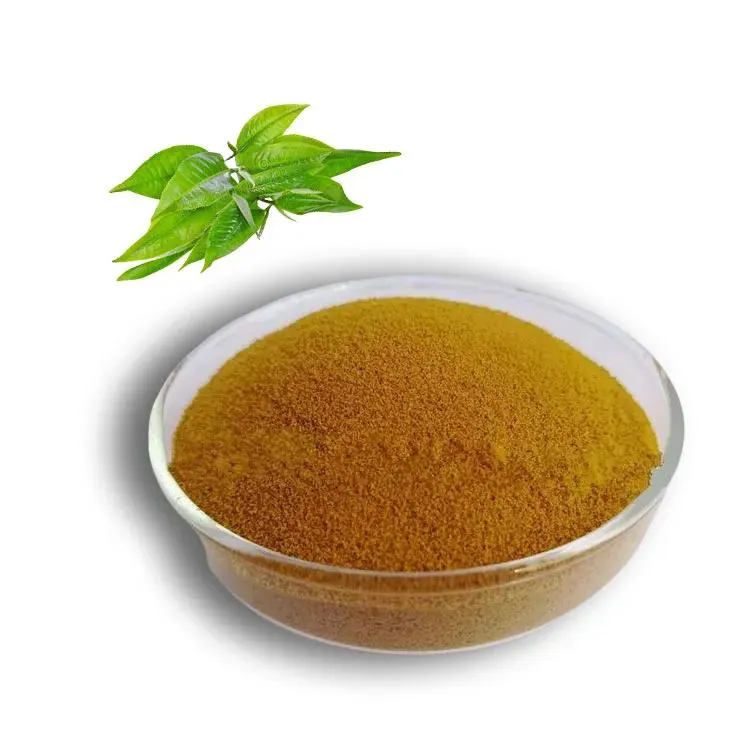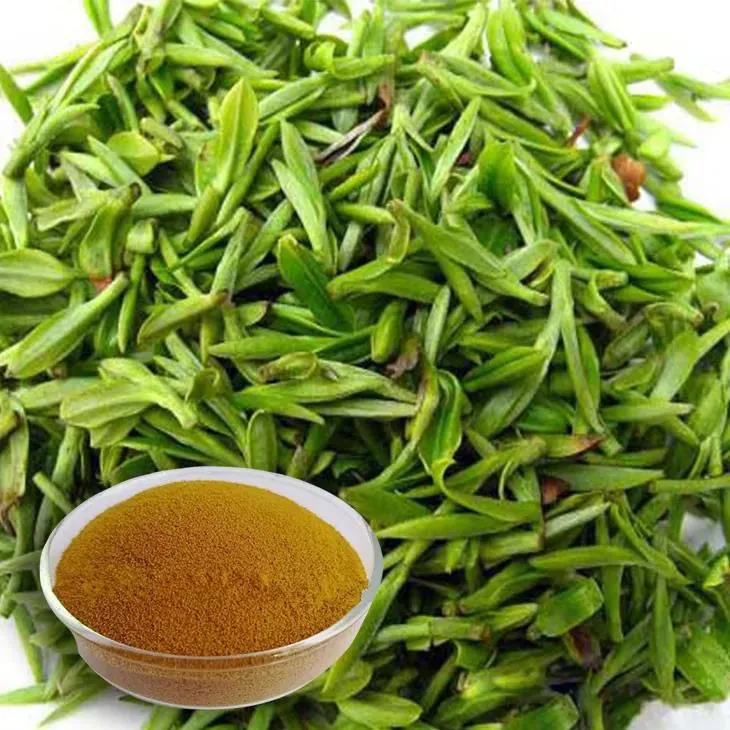- 0086-571-85302990
- sales@greenskybio.com
Scientific Insights: Recent Research Findings on Resveratrol and Green Tea Extract
2024-07-31

1. Introduction
Resveratrol and Green Tea Extract have long been the focus of scientific research due to their potential health benefits. Resveratrol, a polyphenol found mainly in grapes, berries, and peanuts, and Green Tea Extract, rich in catechins, are two natural substances that are increasingly being studied for their role in promoting health and preventing diseases. This article delves into the recent research findings regarding their anti - inflammatory effects, potential in cancer prevention, and influence on metabolic functions.

2. Anti - Inflammatory Effects
2.1 Resveratrol's Anti - Inflammatory Mechanisms
Resveratrol has been shown to exert anti - inflammatory effects through multiple mechanisms. One of the key ways is by modulating the activity of nuclear factor - kappa B (NF - κB), a transcription factor that plays a central role in the inflammatory response. When activated, NF - κB induces the expression of numerous pro - inflammatory cytokines, such as interleukin - 1β (IL - 1β) and tumor necrosis factor - α (TNF - α). Resveratrol can inhibit the activation of NF - κB, thereby reducing the production of these pro - inflammatory mediators.
In addition, resveratrol can also interact with other signaling pathways involved in inflammation. For example, it has been reported to regulate the mitogen - activated protein kinase (MAPK) pathway. By influencing the phosphorylation status of MAPK proteins, resveratrol can further dampen the inflammatory response.
2.2 Green Tea Extract's Anti - Inflammatory Properties
Green tea extract, particularly its major component epigallocatechin - 3 - gallate (EGCG), is also a potent anti - inflammatory agent. EGCG has been demonstrated to suppress the production of inflammatory cytokines in various cell types. It can target macrophages, which are key players in the inflammatory process. By inhibiting the activation of macrophages, EGCG reduces the release of pro - inflammatory factors.
Moreover, green tea extract can modulate the expression of adhesion molecules on endothelial cells. These adhesion molecules are responsible for recruiting immune cells to the site of inflammation. By reducing their expression, green tea extract can limit the infiltration of inflammatory cells, thereby alleviating inflammation.

3. Potential in Cancer Prevention
3.1 Resveratrol and Cancer
Resveratrol has shown potential in cancer prevention through several mechanisms. Firstly, it has antioxidant properties that can help protect cells from oxidative damage, which is often associated with the development of cancer. Oxidative stress can cause DNA mutations and epigenetic changes that may lead to uncontrolled cell growth.
Secondly, resveratrol can induce cell cycle arrest in cancer cells. By interfering with the cell cycle regulatory proteins, such as cyclins and cyclin - dependent kinases (CDKs), resveratrol can prevent cancer cells from dividing and proliferating. For example, in some cancer cell lines, resveratrol has been shown to block the transition from the G1 to S phase of the cell cycle.
Additionally, resveratrol can promote apoptosis, or programmed cell death, in cancer cells. It can activate the apoptotic pathways by upregulating pro - apoptotic proteins and downregulating anti - apoptotic proteins. This helps to eliminate cancer cells from the body.
3.2 Green Tea Extract and Cancer Prevention
Green tea extract, especially EGCG, has also been extensively studied for its cancer - preventive effects. EGCG can inhibit the growth and survival of cancer cells through multiple mechanisms. One mechanism is by inhibiting the activity of enzymes involved in cancer cell growth, such as tyrosine kinases. These kinases are often overexpressed in cancer cells and play a crucial role in cell proliferation and survival.
Green tea extract can also modulate the epigenetic regulation of genes in cancer cells. Epigenetic changes, such as DNA methylation and histone modification, can affect the expression of cancer - related genes. EGCG has been shown to reverse abnormal epigenetic modifications, leading to the re - expression of tumor - suppressor genes and the suppression of oncogenes.
Moreover, green tea extract can enhance the body's immune response against cancer cells. It can stimulate the activity of natural killer (NK) cells and cytotoxic T lymphocytes (CTLs), which are important components of the immune system for recognizing and eliminating cancer cells.

4. Influence on Metabolic Functions
4.1 Resveratrol's Impact on Metabolism
Resveratrol has been found to have a significant impact on metabolic functions. It can improve insulin sensitivity in the body. Insulin resistance is a key factor in the development of type 2 diabetes. Resveratrol can activate AMP - activated protein kinase (AMPK), which is a key regulator of cellular energy homeostasis. By activating AMPK, resveratrol can enhance glucose uptake in cells, improve lipid metabolism, and reduce hepatic glucose production.
In addition, resveratrol can also affect lipid metabolism. It has been shown to reduce the levels of triglycerides and cholesterol in the blood. Resveratrol can increase the activity of peroxisome proliferator - activated receptor - α (PPAR - α), which is involved in the regulation of lipid metabolism. By activating PPAR - α, resveratrol promotes the breakdown of fatty acids and the clearance of lipids from the blood.
4.2 Green Tea Extract and Metabolic Regulation
Green tea extract also plays an important role in metabolic regulation. EGCG can increase energy expenditure in the body. It has been shown to stimulate thermogenesis, which is the process of heat production in the body. This can help in weight management as it increases the body's calorie - burning capacity.
Green tea extract can also improve glucose tolerance. It can enhance the function of pancreatic beta cells, which are responsible for insulin secretion. By improving glucose tolerance, green tea extract can help prevent the development of type 2 diabetes.
Moreover, green tea extract can have an impact on lipid metabolism. It can reduce the absorption of dietary lipids in the intestine, leading to a decrease in blood lipid levels.
5. Conclusions
In conclusion, resveratrol and green tea extract are two natural substances with a wide range of potential health benefits. Their anti - inflammatory effects, potential in cancer prevention, and influence on metabolic functions make them promising candidates for further research and development. However, more studies are needed to fully understand their mechanisms of action, optimal dosages, and long - term safety. With continued research, it is hoped that these substances can be harnessed to improve human health in the future.
FAQ:
What are the anti - inflammatory mechanisms of resveratrol?
Resveratrol has several anti - inflammatory mechanisms. It can inhibit the activation of certain inflammatory signaling pathways, such as the NF - κB pathway. By doing so, it reduces the production of pro - inflammatory cytokines like interleukin - 1β (IL - 1β) and tumor necrosis factor - α (TNF - α). Additionally, resveratrol may also modulate the activity of immune cells involved in the inflammatory response, helping to dampen inflammation.
How does green tea extract contribute to cancer prevention?
Green tea extract contains compounds like catechins, particularly epigallocatechin - 3 - gallate (EGCG). EGCG can interfere with cancer cell growth at multiple stages. It may induce apoptosis (programmed cell death) in cancer cells, inhibit angiogenesis (the formation of new blood vessels that tumors need to grow), and also block the activation of certain oncogenes. Moreover, it can enhance the body's antioxidant defenses, which may help protect cells from DNA damage that could lead to cancer.
What impact does resveratrol have on metabolic functions?
Resveratrol can influence metabolic functions in several ways. It has been shown to improve insulin sensitivity, which helps regulate blood sugar levels. It may also increase the activity of mitochondria, the powerhouses of cells, leading to more efficient energy production. Additionally, resveratrol can affect lipid metabolism by reducing the levels of triglycerides and cholesterol in the blood, which is beneficial for cardiovascular health.
Are there any side effects associated with taking green tea extract?
When taken in moderation, green tea extract is generally safe for most people. However, in some cases, it may cause side effects such as nausea, vomiting, and stomach upset. High doses of green tea extract may also interact with certain medications, for example, it can interfere with the effectiveness of blood - thinning medications. Pregnant and breastfeeding women should be cautious when using green tea extract as it may have potential effects on the fetus or infant.
How can resveratrol and green tea extract be incorporated into a daily diet?
Resveratrol can be found in foods like grapes, red wine, and peanuts. To incorporate it into the diet, one can consume these foods regularly. However, the amount of resveratrol in these natural sources may vary. Green tea extract can be obtained by drinking green tea. Drinking 2 - 3 cups of green tea daily can provide a reasonable amount of the beneficial compounds. There are also green tea extract supplements available, but it is important to consult a healthcare provider before starting any supplement regimen.
Related literature
- Resveratrol: A Review of Its Anti - Inflammatory, Anti - Cancer, and Metabolic Effects"
- "Green Tea Extract and Health: A Comprehensive Review of the Scientific Evidence"
- "The Role of Resveratrol and Green Tea in Preventing Chronic Diseases"
- ▶ Hesperidin
- ▶ Citrus Bioflavonoids
- ▶ Plant Extract
- ▶ lycopene
- ▶ Diosmin
- ▶ Grape seed extract
- ▶ Sea buckthorn Juice Powder
- ▶ Fruit Juice Powder
- ▶ Hops Extract
- ▶ Artichoke Extract
- ▶ Mushroom extract
- ▶ Astaxanthin
- ▶ Green Tea Extract
- ▶ Curcumin
- ▶ Horse Chestnut Extract
- ▶ Other Product
- ▶ Boswellia Serrata Extract
- ▶ Resveratrol
- ▶ Marigold Extract
- ▶ Grape Leaf Extract
- ▶ New Product
- ▶ Aminolevulinic acid
- ▶ Cranberry Extract
- ▶ Red Yeast Rice
- ▶ Red Wine Extract
-
Calendula Extract
2024-07-31
-
Chia Seed Powder
2024-07-31
-
Maitake Mushroom Extract
2024-07-31
-
Camu Camu Extract
2024-07-31
-
Moringa powder
2024-07-31
-
Shikone Extract
2024-07-31
-
Curcuma Longa Extract
2024-07-31
-
Saponin Extract
2024-07-31
-
Hawthorn Extract
2024-07-31
-
Tinospora cordifolia extract
2024-07-31





















